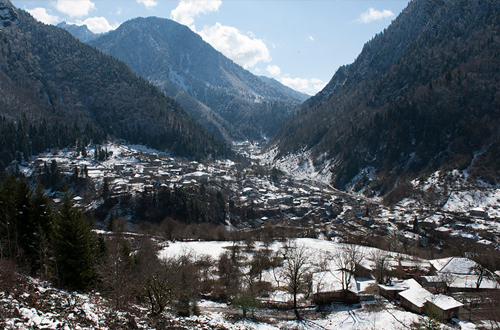
Parliament Adopts Bill on Benefits for High Mountainous Regions

View of the village of Khaishi in the mountainous region of Svaneti, March, 2014. Photo: Eana Korbezashvili/Civil.ge
Parliament adopted with its third and final reading on July 16 a bill envisaging a broad range of benefits for the residents of high mountainous regions, which will require at least GEL 93 million of funding.
Most of those benefits, including allowances for teachers, doctors and pensioners, will go into force in 2016 and some others, such as partial funding for household electricity bills will go into force in 2017. The proposal also envisages tax breaks for selected enterprises, operating in the mountainous regions.
Starting from January 2016, the bill envisages allowance in an amount of GEL 100 per month for one-year period to the family with first and second newborn child and GEL 200 alliance per month for third and any subsequent children for a two-year period, as well as additional funding for public schools located in mountainous areas.
Bonuses in an amount of double state pension for doctors and bonus in an amount of a single state pension for nurses, employed in state-owned hospitals and medical centers, will be introduced also from January 2016.
Bonuses for public school teachers in an amount of 35% of their monthly salary will be introduced starting from September, 2016.
Pensioners in the mountainous regions will receive an additional allowance of 20% of their monthly pension and those residents of these areas, who are eligible for a social aid package from the state, will receive an additional allowance of 20% of this package from September 2016.
Also starting from September, 2016 unspecified “relevant measures” should be in place to provide heating to households during the winter period – from October 15 to April 15. It will be up to the government to define those “measures”.
Starting from January, 2017 the state will have to cover 50% of electricity bills for those households in the high mountainous regions, who consume no more than 100 kW of electricity per month during the winter period – between October 15 and April 15.
A conservative estimation by the government suggests that at least GEL 93 million will be required to fund all these benefits.
The government-proposed initial draft envisaged the introduction of most of these benefits at a later date – some of them in 2018. But dates were moved forward after insistence of a group of majoritarian GD lawmakers, who are elected from the constituencies located in the mountainous regions. One of their arguments was that these benefits were part of their pre-election campaign promises to their constituencies and they should be enforced before the sitting parliament’s four-year term expires – that is before the next parliamentary elections in October, 2016.
The bill also envisages income, profit and property tax exemption for a ten-year term for selected enterprises and individual entrepreneurs operating in high mountainous regions.
The bill says that such tax exempts can apply to those entities, which will be granted status of “high mountainous settlement enterprise”; it will be up to the government to decide which enterprise will be granted this status.
The bill also says that tax breaks should not apply to businesses, which require licenses or permits to operate (for example mining); as well as to businesses in service and trade sectors. But it also says that the government will have the right to make exceptions and apply tax breaks for businesses operating in those sectors; it will be up to the government to set criteria for such exceptions.
Opposition UNM lawmakers were offering to set precise criteria for tax breaks in the bill itself, instead of giving this power to the government; they argued that the proposed scheme was increasing corruption risk.
According to the bill, the status of "high mountainous areas" should be given to settlements located at least 1,500 meters above sea level in following regions: Khevi, Mtiuleti, Pankisi gorge; mountainous parts of Adjara; Gudamakari valley; Pshav-Khevsureti; Tusheti; Svaneti; Lechkhumi and Racha.
The government will have the right to also grant this status to settlements located 800 meters above sea level, taking into consideration conditions ranging from agriculture land areas to the depopulation of such settlements.
A Georgian citizen living for at least 9 months a year in the high mountainous settlements will be eligible for the benefits envisaged by the bill. The Gamgebeli (head of the municipality) or a mayor will have the authority of granting the status of “a resident of high mountainous settlement”. When the bill was debated in the parliament, opposition lawmakers from UNM expressed fears that giving this authority to the local officials is fraught with a corruption risk and people, who are not actually residing in the high mountainous areas, may appear in the list of those eligible to benefits.
This post is also available in: ქართული Русский